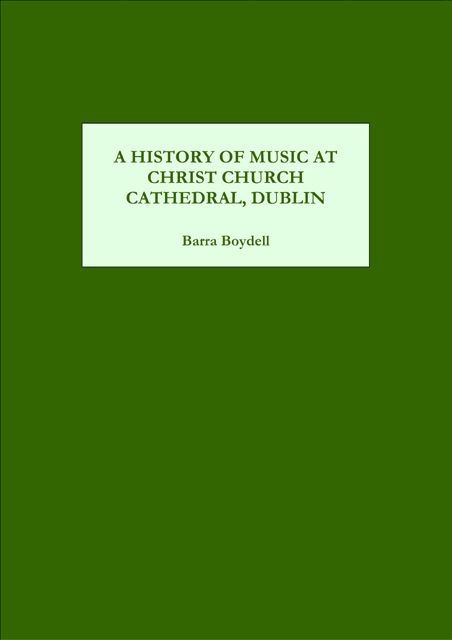Book contents
- Frontmatter
- Contents
- Plates and Musical Examples
- Foreword
- Preface
- Editorial Conventions
- Introduction
- One ‘Dulces Fecit Modos’: The Medieval Cathedral-Priory
- Two ‘For the More Honour of God’s Divine Service’: The Reformation and Early Seventeenth Century
- Three “So Great and Solemn Service’: The Restoration and Later Seventeenth Century
- Four ‘The Increasing Excellence of the Choir’: The Eighteenth and Early Nineteenth Centuries
- Five ‘A More Efficient Performance of the Duties of the Choir’: The Mid-Nineteenth Century
- Six Decline and Revival: Disestablishment and the Twentieth Century
- Appendix One Succession Lists of Organists and Assistant Organists
- Appendix Two Succession List of Masters of the Boys/Music Masters/Choir Masters
- Abbreviations and Bibliography
- Index
Four - ‘The Increasing Excellence of the Choir’: The Eighteenth and Early Nineteenth Centuries
Published online by Cambridge University Press: 21 March 2023
- Frontmatter
- Contents
- Plates and Musical Examples
- Foreword
- Preface
- Editorial Conventions
- Introduction
- One ‘Dulces Fecit Modos’: The Medieval Cathedral-Priory
- Two ‘For the More Honour of God’s Divine Service’: The Reformation and Early Seventeenth Century
- Three “So Great and Solemn Service’: The Restoration and Later Seventeenth Century
- Four ‘The Increasing Excellence of the Choir’: The Eighteenth and Early Nineteenth Centuries
- Five ‘A More Efficient Performance of the Duties of the Choir’: The Mid-Nineteenth Century
- Six Decline and Revival: Disestablishment and the Twentieth Century
- Appendix One Succession Lists of Organists and Assistant Organists
- Appendix Two Succession List of Masters of the Boys/Music Masters/Choir Masters
- Abbreviations and Bibliography
- Index
Summary
The eighteenth century was a defining period in Dublin’s cultural history, the physical appearance of the modern city being to a significant extent still dominated by the public and private buildings erected during that time. As a capital city and the second in size after London within Great Britain and Ireland, Dublin enjoyed a prolonged period of prosperity and at least superficial peace. Over the period covered by this chapter its population increased from nearly 60,000 in 1700, to about 140,000 in 1760, and approaching 250,000 by the 1820s, an increase which brought with it an ever larger number of people able to afford and patronise the arts, in particular music. A vibrant musical life developed with public concerts forming an essential part of fashionable life. It was here that Handel’s Messiah was first performed in 1742, an event with which the choir of Christ Church cathedral was closely involved. Handel’s visit was not exceptional: musicians from all over Europe visited Dublin, some like Geminiani choosing to settle in the city for longer periods. This vibrant musical life within the wider city was reflected in a period of notable musical activity at Christ Church, in particular during the century between Ralph Roseingrave’s appointment as organist in 1727 and the death in 1833 of John Stevenson, vicar choral and composer of anthems and services which would remain amongst the most popular in the repertoires of the Dublin cathedrals throughout the nineteenth century. The music of these composers alongside that of leading later seventeenth- and eighteenth-century English cathedral composers survives in the extensive series of choir books from both cathedrals copied in the eighteenth and early nineteenth centuries. Although prohibited by the dean and chapter from performing in public for personal gain, members of the cathedral choir (including choirboys) took an active part in Dublin’s musical life including Handel’s oratorio performances in 1741–2 and the concerts held for the benefit of the Rotunda hospital which took place during the summer months for nearly forty years up to 1791.
- Type
- Chapter
- Information
- A History of Music at Christ Church Cathedral, Dublin , pp. 101 - 149Publisher: Boydell & BrewerPrint publication year: 2004



